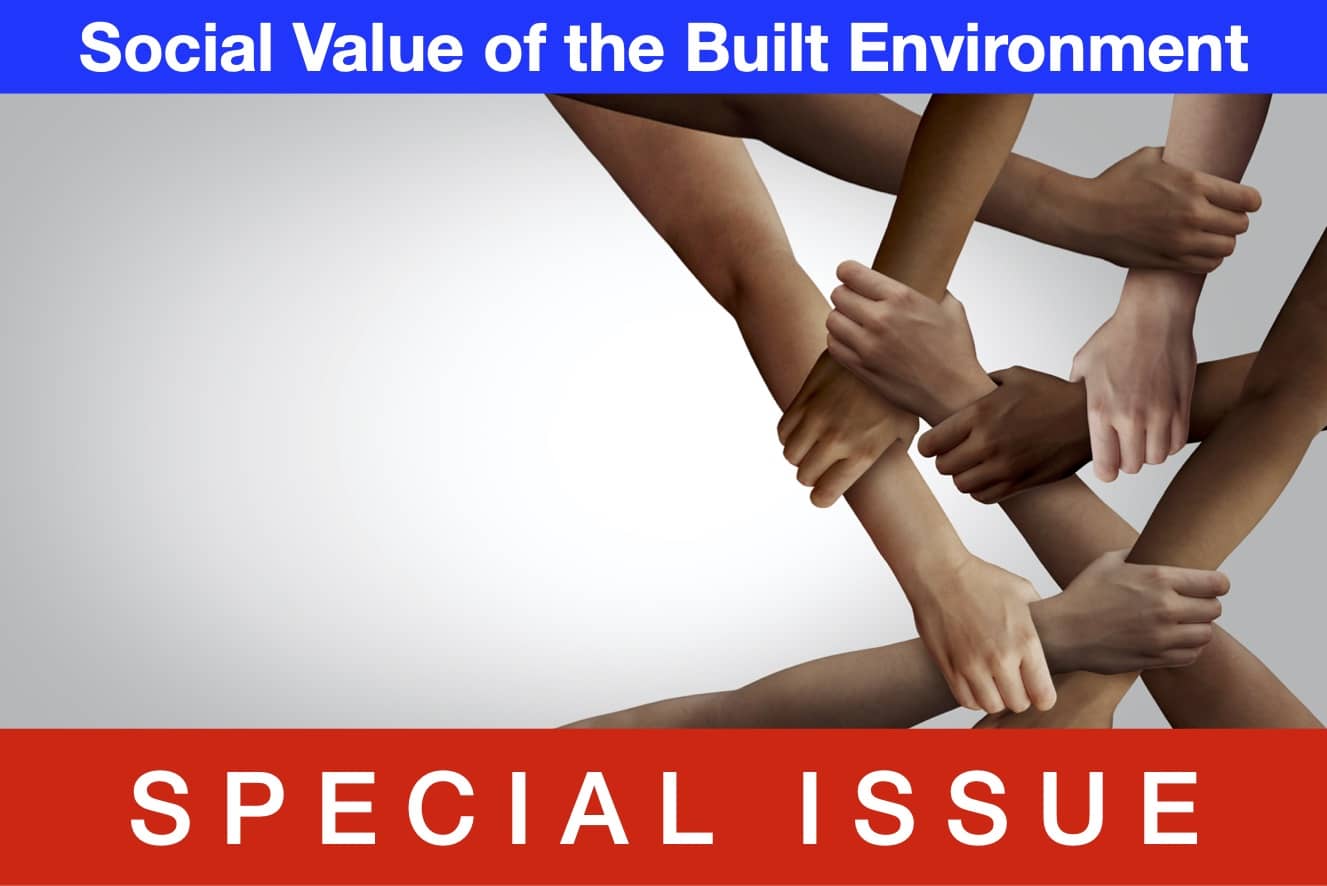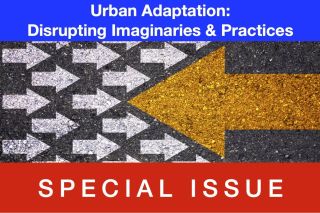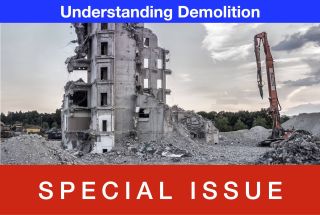
www.buildingsandcities.org/journal-content/special-issues/social-value-si.html
Social Value of the Built Environment

How is social value created, defined and measured in both placemaking (urban design, architecture and real estate) and construction (procurement and labour) processes?
Social value has an important role to play in the delivery of the SDGs. A rebalancing of value to include social and environmental value, as well as economic and commercial value, is needed to ensure the shaping of communities and places will have wellbeing outcomes. This special issue explores current and potential approaches to defining, delivering, monitoring and evaluating social value in the built environment, its benefits and consequences and its relation to other existing policy mechanisms.
Guest editors: Flora Samuel and Kelly Watson
The concept of social value has gained significant prominence in recent years in some countries, yet remains misunderstood. There is a recognised need for it to be better defined, interpreted and embedded in planning, design and operation. This will entail measurement and assessment. Social value is increasingly being considered alongside issues of quality of life and wellbeing, to both the individual and the community, but it remains challenging to reconcile social value in a meaningful way with the present value management approaches that dominate the construction and real estate industries.
This special issue brings together a series of contributions to current thinking and critical discussion on social value, including empirical research from across the UK, Europe and Australia. How can planners, clients, designers create and evaluate social value at different scales? How can local stakeholders (communities) be involved and empowered? How can the intended outcomes be assured? Collectively, the papers in this special issue point to new practices for the planning, design, construction and operation of projects. A series of gaps are also identified in social value research, most notably a discussion of social value in the context of real estate, valuation and 'environmental, social and corporate governance' (ESG).
Table of contents
Social value of the built environment [editorial]
F. Samuel & K. Watson
Politics of social value in the
built environment
M.S. Çıdık
Added
value and numerical measurement of social value: a critical enquiry
A. Raiden & A. King
Improving social value through
facilities management: Swedish housing companies
D. Troje
Assessing social value in housing
design: contributions of the capability approach
J.-C. Dissart & L. Ricaurte
Wellbeing fostered by design: a
framework for evaluating indoor environment performance
J. Croffi, D. Kroll, V. Soebarto,
H. Barrie & K. McDougall
The social value of public spaces
in mixed-use high-rise buildings
H. Barrie, K. McDougall, K. Miller
& D. Faulkner
Social values and social
infrastructures: a multi-perspective approach to place
A. Legeby & C. Pech
Assessing the social values of
historic shopping arcades: building biographies
A. Skoura & A. Madden
Feedback on the special issue
Social value: an architect's perspectiveEdward Ng
Latest Peer-Reviewed Journal Content
Energy sufficiency, space temperature and public policy
J Morley
Living labs: a systematic review of success parameters and outcomes
J M Müller
Towards a universal framework for heat pump monitoring at scale
J Crawley, L Domoney, A O’Donovan, J Wingfield, C Dinu, O Kinnane, P O’Sullivan
Living knowledge labs: creating community and inclusive nature-based solutions
J L Fernández-Pacheco Sáez, I Rasskin-Gutman, N Martín-Bermúdez, A Pérez-Del-Campo
A living lab approach to co-designing climate adaptation strategies
M K Barati & S Bankaru-Swamy
Mediation roles and ecologies within resilience-focused urban living labs
N Antaki, D Petrescu, M Schalk, E Brandao, D Calciu & V Marin
Negotiating expertise in Nepal’s post-earthquake disaster reconstruction
K Rankin, M Suji, B Pandey, J Baniya, D V Hirslund, B Limbu, N Rawal & S Shneiderman
Designing for pro-environmental behaviour change: the aspiration–reality gap
J Simpson & J Uttley
Lifetimes of demolished buildings in US and European cities
J Berglund-Brown, I Dobie, J Hewitt, C De Wolf & J Ochsendorf
Expanding the framework of urban living labs using grassroots methods
T Ahmed, I Delsante & L Migliavacca
Youth engagement in urban living labs: tools, methods and pedagogies
N Charalambous, C Panayi, C Mady, T Augustinčić & D Berc
Co-creating urban transformation: a stakeholder analysis for Germany’s heat transition
P Heger, C Bieber, M Hendawy & A Shooshtari
Placemaking living lab: creating resilient social and spatial infrastructures
M Dodd, N Madabhushi & R Lees
Church pipe organs: historical tuning records as indoor environmental evidence
B Bingley, A Knight & Y Xing
A framework for 1.5°C-aligned GHG budgets in architecture
G Betti, I Spaar, D Bachmann, A Jerosch-Herold, E Kühner, R Yang, K Avhad & S Sinning
Net zero retrofit of the building stock [editorial]
D Godoy-Shimizu & P Steadman
Co-learning in living labs: nurturing civic agency and resilience
A Belfield
The importance of multi-roles and code-switching in living labs
H Noller & A Tarik
Researchers’ shifting roles in living labs for knowledge co-production
C-C Dobre & G Faldi
Increasing civic resilience in urban living labs: city authorities’ roles
E Alatalo, M Laine & M Kyrönviita
Co-curation as civic practice in community engagement
Z Li, M Sunikka-Blank, R Purohit & F Samuel
Preserving buildings: emission reductions from circular economy strategies in Austria
N Alaux, V Kulmer, J Vogel & A Passer
Urban living labs: relationality between institutions and local circularity
P Palo, M Adelfio, J Lundin & E Brandão
Living labs: epistemic modelling, temporariness and land value
J Clossick, T Khonsari & U Steven
Co-creating interventions to prevent mosquito-borne disease transmission in hospitals
O Sloan Wood, E Lupenza, D M Agnello, J B Knudsen, M Msellem, K L Schiøler & F Saleh
Circularity at the neighbourhood scale: co-creative living lab lessons
J Honsa, A Versele, T Van de Kerckhove & C Piccardo
Positive energy districts and energy communities: how living labs create value
E Malakhatka, O Shafqat, A Sandoff & L Thuvander
Built environment governance and professionalism: the end of laissez-faire (again)
S Foxell
Co-creating justice in housing energy transitions through energy living labs
D Ricci, C Leiwakabessy, S van Wieringen, P de Koning & T Konstantinou
HVAC characterisation of existing Canadian buildings for decarbonisation retrofit identification
J Adebisi & J J McArthur
Simulation and the building performance gap [editorial]
M Donn
Developing criteria for effective building-sector commitments in nationally determined contributions
P Graham, K McFarlane & M Taheri
Join Our Community

The most important part of any journal is our people – readers, authors, reviewers, editorial board members and editors. You are cordially invited to join our community by joining our mailing list. We send out occasional emails about the journal – calls for papers, special issues, events and more.
We will not share your email with third parties. Read more



Latest Commentaries
COP30 Report
Matti Kuittinen (Aalto University) reflects on his experience of attending the 2025 UN Conference of the Parties in Belém, Brazil. The roadmaps and commitments failed to deliver the objectives of the 2025 Paris Agreement. However, 2 countries - Japan and Senegal - announced they are creating roadmaps to decarbonise their buildings. An international group of government ministers put housing on the agenda - specifying the need for reduced carbon and energy use along with affordability, quality and climate resilience.
Building-Related Research: New Context, New Challenges
Raymond J. Cole (University of British Columbia) reflects on the key challenges raised in the 34 commissioned essays for Buildings & Cities 5th anniversary. Not only are key research issues identified, but the consequences of changing contexts for conducting research and tailoring its influence on society are highlighted as key areas of action.